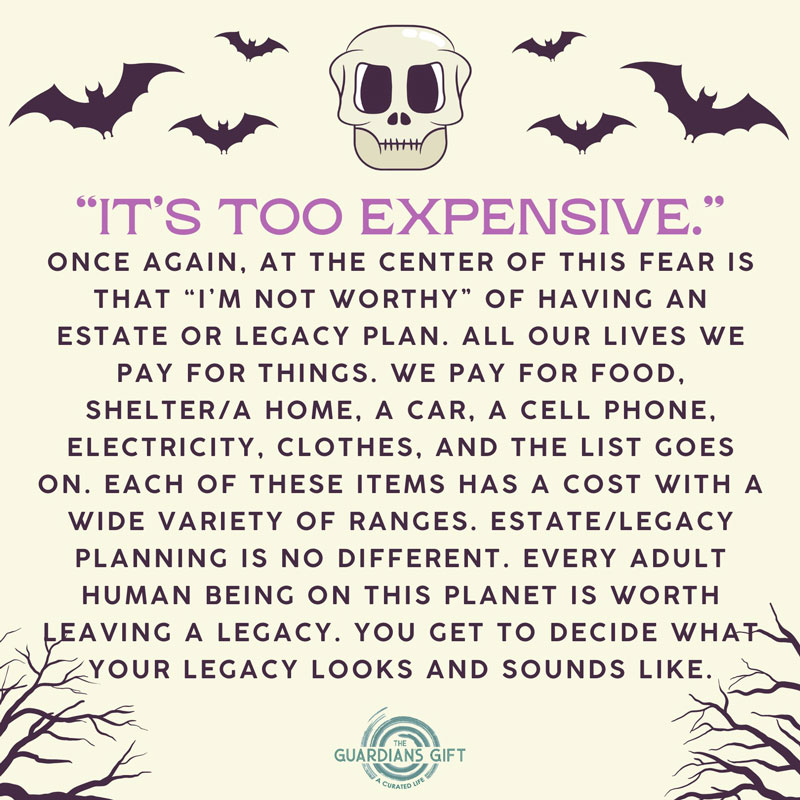When considering why people don’t have a legacy plan or at the very least an ordinary estate plan, I came up with several “reasons” I’ve either heard or I know get in the way. These reasons are quite common but I want to take us deeper into the fears behind the reasons. A lot of times when we get shutdown and are prevented from doing a thing, it’s often from a place of fear. Let’s begin.
- “I won’t be here and my family can handle it.”
This is probably one of the statements I hear most often and it almost always catches me off guard. My first response to this statement is, “how selfish!” Why would anyone slough off taking care of their own “stuff” and thereby, create a problematic mess for their family? Of course, that is my bias and thought process.
At the core of this statement is the difficulty we humans have considering our own mortality. Many of the “reasons” listed below are folded into, and connected to, the core avoidance of the knowledge that our time on this earth is finite, is limited. The truth is that we are not going to live forever and we avoid even thinking about that.
Another deeply experienced fear is that we aren’t smart enough to figure out what needs to be done. There is most definitely a mystique surrounding “estate or legacy planning.” The legalese sounds like, and appears to be, a thing that only wealthy people do because they can afford to hire an attorney or legal firm to take care of it all. The second part of that same fear is, “I don’t even know where to begin.” The truth is that like everyone else, there are lots of wealthy people who avoid legacy planning. If you can honestly answer questions about your own life, you can create a legacy plan.
One very unconscious fear (or maybe it’s an ego need) is that by leaving a mess for my family they will be forced to remember and think about me when they’re dealing with all my stuff. Some people and families thrive on drama because that’s how they learned to feel important to their family. If there is no drama, they must not love me. I’ve actually had family members tell me they believe their deceased person is watching the unfolding drama and enjoying the chaos and turmoil the family is experiencing.
- “I don’t have family to leave anything.”
People who think this way have a limited understanding of what family is. Here are several quotes that exemplify the ideal of family:
- “Friends are the family you choose.” – Jess C. Scott
- “The bond that links your true family is not one of blood, but of respect and joy in each other’s life.” – Richard Bach
- “No matter how little money and how few possessions you own, having a dog makes you feel rich.” Louis Sabin, American Author
- “Home is where the dog runs to greet you.” Unknown
Not only do you have family and friends to include in your estate planning, but there are many organizations that need your gift. It is important that your beloved pets are cared for after you’re gone. It’s also important that your memory is eternalized in the gifts you leave to an organization helping humanity and the world.
The fear here is that all you have done and accomplished will be for nothing and will be wasted. You can make a difference with a multitude of options. You get to choose how you are remembered.
- “I don’t have anything of value to leave to anyone.”
Sometimes people believe they must have money, homes, cars, or other material possessions to leave to their loved ones. A huge fear is that I won’t be remembered as valuable and important to my family because I didn’t leave them “an inheritance.”
Let me assure you that the most valuable and important inheritance you can leave is your story. Your story is filled with your wit, wisdom, and the memories shared with you in them. Your story is the centerpiece of what legacy planning is all about. Your legacy is the trials, tribulations, and struggles of life lived with others laced with laughter and moments of joy and celebration and have nothing to do with what is usually considered an inheritance.
- “It’s too expensive.”
Once again, at the center of this fear is that “I’m not worth or worthy” of having an estate or legacy plan. All our lives we pay for things. We pay for food, shelter/a home, a car, a cell phone, electricity, clothes, and the list goes on. Each of these items has a cost with a wide variety of ranges. Estate/Legacy planning is no different. Every adult human being on this planet is worth leaving a legacy. You get to decide what your legacy looks and sounds like.
- “It’s too complicated.”
This fear is explained above and linked to fear #1: Another deeply experienced fear is that we aren’t smart enough to figure out what needs to be done. There is most definitely a mystique surrounding “estate planning.” The legalese of estate planning sounds like, and appears to be, a thing that only wealthy people do because they can afford to hire an attorney or legal firm to take care of it all. The second part of that same fear is, “I don’t even know where to begin.” The truth is that like everyone else, there are lots of wealthy people who avoid estate planning. If you can honestly answer questions about your own life, you can create a legacy plan.
- “I don’t have time to do this.”
People find time to do the things that are important to them. Sadly, many people don’t take time to care for themselves because they don’t value themselves. Legacy planning has a component of caring for yourself. Unlike ordinary estate plans, a good legacy plan should have a component of planning for personal care as aging progresses.
When we don’t take time to consider and plan for our old age we create a huge burden for our family. That is the one consistent and loud concern I hear from people, “I never want to be a burden to my family.” Because we avoid dealing with our own aging process and we don’t take time to plan for it, we become a burden for our family members.
- “I’m too young. I’m healthy”
AVOIDANCE of the inevitable is one of our biggest human fears. As I said above, we hate thinking about our own mortality. Once again, we aren’t going to live forever! One of the unpleasant realities of life, particularly in the last couple of years, is that accidents, disease and sickness are no respecters of age, yours or anyone else’s.
People from every era, age 30 through age 80, have all said to me, “I’m too young and healthy and I’ve got time. I’ll do it later.” Many families have suffered when their loved one died without any planning in place. No planning creates a burdensome mess for your loved ones when they can least afford that pain.
- “Dwelling on my death too much it might cause it to happen.”
This is a superstition people believe but don’t often voice. We humans have always had a fear of death and the dead. Authors and filmmakers have capitalized on this. They know that to scare someone, all they need to do is have a cemetery setting at night and a dead body or the undead lurking nearby. Many of the rituals that have developed over the years are based on these superstitious fears.
Here are some superstitions from an article by Marilyn A. Mendoza Ph.D. in the journal Psychology Today:
- After a death, windows were closed so the deceased’s soul could not fly out. Today, there are many who break with tradition and open a window so the soul can be free.
- Mirrors were covered after a death so that the spirit could not be trapped in it. Another superstition associated with covering mirrors is that the first to see their reflection in the mirror is the next to die.
- Clocks were to be stopped at the time of the death.
- Coins were used to cover the deceased’s eyes. This originated in ancient Greece where coins were placed in the mouth of the deceased for payment to the underworld. More recently, coins were used to keep the eyes of the deceased closed as eyes were considered the windows of the soul. Therefore, it was important to not let the soul leave the body to harm the living.
- When the deceased was carried out of the house, it was always feet first. This was done to keep the deceased from looking into the house and getting another family member to join him.
- After the death, the body was watched over by family and friends to ensure that the spirit did not leave the body. Watching over the dead was also a way to avoid a premature burial. Taphephobia was the term given to the fear of being buried alive, a not uncommon occurrence in the 19th century.
- Those who watched over the body were instructed to cover their mouth if they yawned so the spirit could not enter their body.
- Covering the deceased with a sheet was another way the living protected themselves from the soul leaving the deceased’s body.
- Family pictures were also turned face down as another way to keep from being possessed by the spirit of the deceased.
In addition to the superstitions about the dead’s body, there are also many superstitions associated with cemeteries and burial.
- Special mourning clothing, including veils, were worn as a way of hiding the mourner’s identity, protecting them from the dead. In England and the United States, clothing in black was associated with the grief of the mourner.
- When passing a cemetery, people were told to hold their breath, otherwise, they would not be buried.
- Pallbearers were to wear gloves so the spirit of the deceased could not enter the body.
- Bells ringing at a funeral were also ways to keep the spirit away.
- Rain on a funeral was felt to be a good omen that the deceased would go to heaven. If it thundered, that was even better as it indicated that the soul had made it to heaven.
- Tombstones were initially just rocks and stones used to mark where the deceased was buried. But over time, the stones became large monuments not only to mark the grave but to keep the spirit from escaping.
- Taking flowers from a grave means that the spirit will haunt you.
- One should never whistle in a cemetery as it will summon the devil.
- Finally, some clever entrepreneur must have started this superstition: As long as the funeral bill remains unpaid, the dead will not rest in the grave.
These eight “reasons” are only a few of the many fears that get in our way of creating our legacy plan. There are many others but these are ones I hear frequently. I would love to hear from you about other fears or variations of the ones listed above that you know.
Is there one of these fears that resonates with you? I’d like to know your thoughts about the difficulty of and avoidance of legacy planning.
Maybe this has spurred you to finally get your plan in place. I’d love to help you with creating a legacy plan beyond an ordinary old estate plan.
~Dr. Judy






